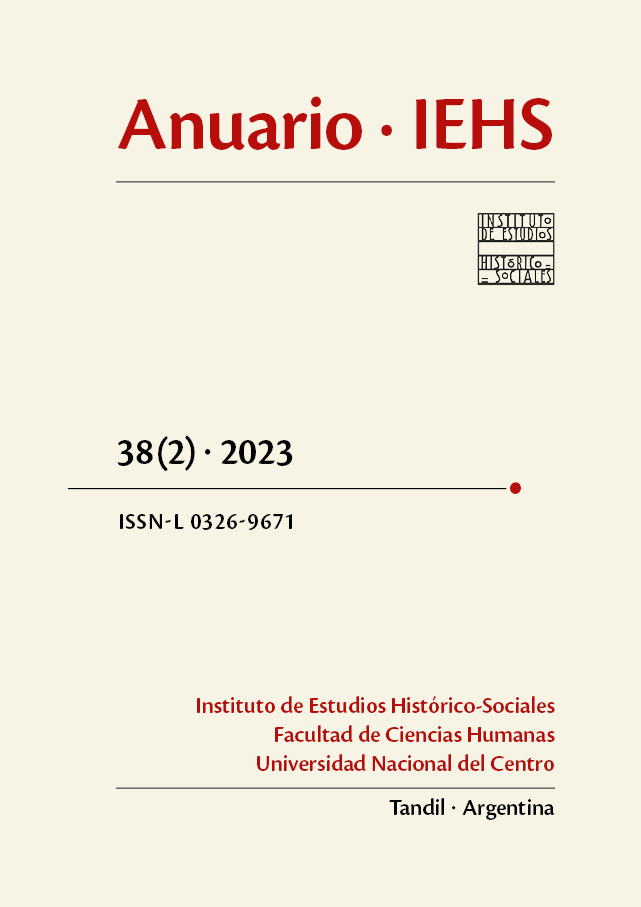Anticomunism, intellectuals and universities in the Americas: The Latin American Anti-comunist Confederation at the service of capitalist hegemony in the post-war
DOI:
https://doi.org/10.37894/ai.v38i2.1886Keywords:
Intellectuals, Universities, AnticommunismAbstract
In order to understand the degree of sophistication and organization reached by the actions of anti-communist groups in the Latin American subcontinent, and worldwide, it is necessary to pay attention to the formation of intellectuals who organized themselves in the various stages that functioned as blockhouses to defend an intransigent position with respect to a wide myriad of oppositions to the capitalist status quo. In this way, we highlight the protagonism of US imperialist actions in terms of material and ideological control of the conjunctures that make up the broad and diverse framework of countries that suffered varied and continuous interventions in the American context. From the point of view of the historicity of that process, we highlight the countless transformations that the world of war production went through which was the main contributor for the part of the academic and university intelligentsia to joined to extra-university guidelines and anti-communist in some of the main American countries. As a result, I present the performance of the Latin American Anticommunist Confederation and its anticommunist action of reception and dissemination of strategies to combat communism in universities.
References
ALLEN, J. S., (1947). O Plano Marshall. Problemas. Revista mensual de cultura política, n° 2.
AnDERSON, P. 1995. Balanço do Neoliberalismo. Em E. SADER & P. GENTILI (orgs.), Pós- neoliberalismo: as políticas sociais e o Estado democrático. Rio de Janeiro: Paz e Terra.
BANDEIRA, L. A. M., 2003. Brasil, Argentina e Estados Unidos – Conflito e integração na América do Sul (Da Tríplice Aliança ao Mercosul 1870-2003). Rio de Janeiro: Re-van.
BOSCH, J., 1968. El Pentagonismo. Montevideo: El Siglo Ilustrado.
BUCI-GLUCKSMANN, C., 1980. Gramsci e o Estado. Rio de Janeiro: Paz e Terra.
BUGIATO, C., 2017. Kautsky e Lenin: imperialismo, paz e guerra nas relações internacionais. Revista Novos Rumos, vol. 54, n° 2, pp. 1-20.
CAL. Documento Previo al 3º Congresso, 1977. (ARCHIVO DEL TERROR, R00108 F0898).
CAL, 1977. Índice de las Resoluciones Plenarias al 3º Congreso. (ARCHIVO DEL TERROR, R00145 F0947).
CAVALLO, A., 2008. La Historia Oculta del Régimen Militar. Santiago del Chile: Uqbar Editores.
LEI DE SEGURANÇA NACIONAL (LSN). CPDOC/FGV. Disponivel em: https://cpdoc.fgv.br/producao/dossies/AEraVargas1/anos30-7/RadicalizacaoPolitica/LeiSegurancaNacional. (Acesso em: 02/10/2018).
DREIFUSS, R. A., 1987. A Internacional Capitalista. Estratégias e táticas do empresariado transnacional. (1918-1986). Rio de Janeiro: Espaço e Tempo.
FONTES, V., 2010. O Brasil e o Capital-Imperialismo. Rio de Janeiro: Editora da UFRJ.
GAUDICHAUD, F., 2015. De Santiago a Caracas, o golpismo de Washington. Disponível em: http://diplomatique.org.br/de-santiago-a-caracas-o-golpismo-de-washington/. (Acesso em 01/07/2017).
MACEDONIO, M. N., 2010. Historia de uma Colaboración Anticomunista Transnacional: Los Tecos de la Universidad Autónoma de Guadalajara y el gobierno de Chiang Kai-Shek a principios de los años setenta. Contemporánea. Historia y problemas del siglo XX, vol. 1, año 1, pp. 133-158.
MENDONÇA, S., 2014. O complexo industrial-militar. Anuário Janus, pp. 112-113.
PADRÓS, E., 2003. Capitalismo, Prosperidade e Estado de Bem-estar Social. En C. A. REIS FILHO, O Século XX. Rio de Janeiro: Record. pp. 227-266.
PADRÓS, E., 2005. Como el Uruguay no Hay... Terror de Estado e Segurança Nacional. Uruguai (1968-1985): do Pachecato à Ditadura Civil-Militar. 2005. 2 v. 875 f. Tese de Doutorado em História. Programa de Pós Graduação em História, Universidade Federal do Rio Grande do Sul, Porto Alegre.
PADRÓS, E. S. & RIBEIRO, M. V., 2012. Ditaduras de Segurança Nacional e Terrorismo de Estado. Revista Espaço Plural, vol. 13, n° 17, pp. 239-248.
PADRÓS, E. S., 2013. Cone Sul em Tempos de Ditadura: Reflexões e debates sobre a história recente. Porto Alegre: EVANGRAF-UFRGS.
PARENTI, M., 1970. A Cruzada Anticomunista. Rio de Janeiro: Civilização Brasileira.
RIBEIRO, M. V., 2021. A história da confederação anticomunista latino-americana durante as ditaduras de segurança nacional (1972-1979). São Paulo: Pimenta Cultural.
RIBEIRO, M. V., WOLFART, C., & DA SILVA, M. A. B., (2020). Aspectos da “modernização” da agricultura durante a ditadura civil-militar brasileira (1964-1985): vínculos, métodos e estratégias. Projeto História: Revista Do Programa De Estudos Pós-Graduados De História, vol. 68, pp. 79-112.
ROSTICA, J., 2018. La Confederación Anticomunista Latinoamericana. Las conexiones civiles y militares entre Guatemala y Argentina (1972-1980). Desafíos, vol. 30, n° 1, pp. 309-347.
SILVA, V., 2008. A Aliança para o Progresso no Brasil: de Propaganda Anticomunista a Instrumento de Intervenção Política (1961-1964). 241f. Dissertação (Mestrado em História). Porto Alegre: UFRGS.
VOZA, P., 2017. Intelectuais Orgânicos. Em G. LIGUORI, G. & P. VOZA, Dicionário Gramsciano. Rio de Janeiro: Boitempo. p. 431.
Downloads
Published
Versions
- 2024-06-04 (2)
- 2023-12-20 (1)
Issue
Section
License
Copyright (c) 2023 Anuario IEHS

This work is licensed under a Creative Commons Attribution-NonCommercial 4.0 International License.



